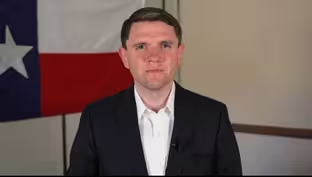
Ex-Trump official: BLS firing undermines trust in key data
Clip: 8/4/2025 | 8m 41sVideo has Closed Captions
Firing of labor statistics head undermines trust in key data, ex-Trump official warns
President Trump is expected to nominate a new head of the Bureau of Labor Statistics this week, days after firing Commissioner Erika McEntarfer following the release of a disappointing jobs report. The president dismissed the data as “rigged” and “manipulated for political purposes.” Geoff Bennett discussed more with William Beach, the commissioner of labor statistics during the first Trump term.
Problems playing video? | Closed Captioning Feedback
Problems playing video? | Closed Captioning Feedback
Major corporate funding for the PBS News Hour is provided by BDO, BNSF, Consumer Cellular, American Cruise Lines, and Raymond James. Funding for the PBS NewsHour Weekend is provided by...

Ex-Trump official: BLS firing undermines trust in key data
Clip: 8/4/2025 | 8m 41sVideo has Closed Captions
President Trump is expected to nominate a new head of the Bureau of Labor Statistics this week, days after firing Commissioner Erika McEntarfer following the release of a disappointing jobs report. The president dismissed the data as “rigged” and “manipulated for political purposes.” Geoff Bennett discussed more with William Beach, the commissioner of labor statistics during the first Trump term.
Problems playing video? | Closed Captioning Feedback
How to Watch PBS News Hour
PBS News Hour is available to stream on pbs.org and the free PBS App, available on iPhone, Apple TV, Android TV, Android smartphones, Amazon Fire TV, Amazon Fire Tablet, Roku, Samsung Smart TV, and Vizio.
Providing Support for PBS.org
Learn Moreabout PBS online sponsorshipGEOFF BENNETT: President Trump is expected to nominate a new head of the Bureau of Labor Statistics this week days after firing Commissioner Erika McEntarfer following the release of a disappointing jobs report.
Friday's report showed just 73,000 jobs added in July, well below expectations, and included sharp downward revisions for May and June.
The president quickly dismissed the data as rigged and manipulated for political purposes, a claim he repeated last night.
DONALD TRUMP, President of the United States: We had no confidence.
I mean, the numbers were ridiculous, what she announced.
But that was just one negative number.
All of the numbers seem to be great.
GEOFF BENNETT: For a closer look, we're joined now by William Beach.
He is the previous commissioner of labor statistics and was nominated by President Trump during his first term in office back in 2017.
Mr. Beach, thanks for being with us.
WILLIAM BEACH, Former U.S. Commissioner of Labor Statistics: Well, it's my pleasure.
Thank you very much for having me.
GEOFF BENNETT: So President Trump called the July numbers fake.
He accused Erika McEntarfer, the BLS commissioner he fired, of rigging the data.
What's your reaction to her firing and the underlying allegation?
WILLIAM BEACH: Well, it's just very implausible.
And I will tell you why.
The commissioner of labor statistics -- that was my job -- has no access to the collection of the data, has no access to the summation of the data when it comes out of the regions, goes to the national office, has no access, no hand, no possibility of having any involvement in the calculation of the numbers that are ultimately published.
In fact, the commissioner doesn't see the number for the first time -- the numbers are revealed to the commissioner Wednesday morning, usually around 11:00, in a meeting.
Those numbers have now been loaded into all the machines all over the data center, which will go all over the world eventually on -- at 8:30 Eastern time Friday morning.
So the claim that the commissioner could influence the data has to be a lot more specific, because there's no access to actually influence the data.
Could the commissioner then have put pressure on people to bend the data in one way or another?
And I want to tell you, that's even more impossible knowing the hardheaded and loyal Americans who work at the Bureau of Labor Statistics, who would never yield to pressure, whole life is devoted to having nonpolitical numbers come out of there.
So I think President Trump just got some bad advice.
The system does not work that way.
It's not like a boardroom or it's not like the YMCA, where you could -- you might have access to change a theme or to change a focus.
It's very difficult to imagine that world working that way at all.
GEOFF BENNETT: You led BLS during the end of the first Trump administration into the beginning of the Biden administration.
Did you ever face political pressure in the role?
WILLIAM BEACH: I think both administrations would very much like -- have liked their priorities to be reflected in the BLS numbers, but neither administration went so far as even to suggest that.
There was never the hint that BLS would be subject to a second look or that I should carry a message back to the staff, you know, the numbers should be a little bit more or a little bit less than what they are.
That is just a -- was never asked that.
So this is what so shocks me that the allegation would be credibly laid at BLS' door.
It does a great deal of damage, by the way, because BLS is a highly trusted worldwide organization at bankers in Dusseldorf.
I had one call me one time who says, we actually stop trading in Dusseldorf 10 minutes prior to 8:30 on Eastern time, because we want to make sure we're ready for that report to come out.
That's how accurate they see it and how important it is.
And when you begin to say, well, it's probably politically rigged or it's not right or something, that -- it throws aspersions on it, not just that it's inaccurate, it is going to take some time to correct that damage.
GEOFF BENNETT: The May and June jobs numbers were revised down by more than 250,000 total.
How unusual are revisions that large?
And if the initial estimates can be so far off, isn't at least some criticism fair?
WILLIAM BEACH: Well, I think everyone should be focused on the reason why those numbers were revised down.
Remember that in May and -- the May and June numbers that were revised down were revised because more information became available, not less.
And what does that mean?
Well, the survey is sent out to 600,000 or so businesses, sometimes less than that.
And then we give three months for a business to get their return in.
About 68 percent return everything the first month.
And on the basis of that, we say, well, the remaining 32 percent of the sample will look just like the first 68 percent.
If we get additional information and it is not like the first 68 percent, then the numbers are revised up or down in the direction of the new information.
And that clearly happened in this case.
We got some information from people, from businesses, and we think it was state and local education units, that was quite different than the first set of data points.
Does this mean the economy is slowing down or does it just mean that we're having a problem in a particular sector of the economy, in this case, state and local education, which is very important, by the way, to the job estimates?
That remains to be seen.
But the point is, the revisions were made because there was more information.
Now, they were big revisions, absolutely, no question about that.
And not too many of those big revisions occur, though many did under my tenure because I was the commissioner during COVID, totally different reasons why the revisions were big.
No one disputed that we shouldn't use more information then to correct the initial estimates.
And I don't think that that dispute should be made now.
This is just getting more information, putting it in place.
GEOFF BENNETT: President Trump says he will nominate someone more competent -- that was the word he chose to use -- than McEntarfer.
It's not clear how he's judging competence.
Can a new commissioner be trusted and be seen as credible?
WILLIAM BEACH: I mean, certainly.
You could have a highly respected individual who has impeccable life credentials in that position.
And I think that's what you need now.
The president has made some assertions, and now you need to have someone in there who will raise the organization back to the level that it should be at, a highly trusted, gold standard organization.
Unfortunately, that person will probably have to deliver one or two months of bad news to the president.
And the impression will be on the part of some who don't follow it as much as you and I do that the number that's reported was probably a lot better than the real number, because the president has now said there are real numbers and there are rigged numbers.
So it's going to take a while.
I'm sure President Trump wants a healthy BLS.
I can't imagine he would not want one.
GEOFF BENNETT: You're assuming that the president will nominate someone who's highly qualified.
But if he fired Erika McEntarfer because he didn't like the jobs report, who's to say he's not going to appoint a yes-man or a yes-woman to that role?
WILLIAM BEACH: I just think that the Senate would have a lot to say about that.
They know on a bipartisan basis how important that position is.
Wall Street has a huge say in all of this.
The people who make investments in this country have a big say in who serves in that position.
You can't see it just as a parochial county judge-type operation, right?
It represents a lot of the data integrity of the United States and is used with huge impact by people making enormous economic decisions.
So whoever is appointed will be highly scrutinized.
And now that that will be a very perhaps controversial appointment and have to go through a great deal of testing.
Congress will be on its front foot when that nominee comes through, regardless of whether they're Republicans or Democrats.
GEOFF BENNETT: William Beach, former BLS commissioner, now executive director of the Fiscal Lab on Capitol Hill.
Thanks for being with us, Mr. Beach.
We appreciate it.
WILLIAM BEACH: My pleasure entirely.
Thank you.
Amy Walter and Jasmine Wright on trust in institutions
Video has Closed Captions
Clip: 8/4/2025 | 8m 58s | Amy Walter and Jasmine Wright on Trump's BLS firing and trust in institutions (8m 58s)
Beirut blast victims struggle as leaders evade blame
Video has Closed Captions
Clip: 8/4/2025 | 7m 35s | 5 years after Beirut blast, victims struggle to rebuild lives as leaders evade blame (7m 35s)
Gates Foundation pledges $2.5B for women’s health worldwide
Video has Closed Captions
Clip: 8/4/2025 | 6m 58s | Gates Foundation pledges $2.5B for women’s health worldwide (6m 58s)
News Wrap: 40 Gazans killed by Israeli gunfire, airstrikes
Video has Closed Captions
Clip: 8/4/2025 | 4m 51s | News Wrap: At least 40 Gazans killed by Israeli gunfire and airstrikes (4m 51s)
Priest says ICE targets migrants at immigration court
Video has Closed Captions
Clip: 8/4/2025 | 6m 48s | Jesuit priest describes seeing ICE agents target migrants at immigration court (6m 48s)
Texas Democrats leave state to stop GOP redistricting plan
Video has Closed Captions
Clip: 8/4/2025 | 3m 28s | Texas Democrats leave state to stop GOP's redistricting plan backed by Trump (3m 28s)
Trump is trying to 'insulate himself,' Texas Democrat says
Video has Closed Captions
Clip: 8/4/2025 | 5m 7s | Trump trying to 'insulate himself from the will of the public,' Texas Democrat says (5m 7s)
Providing Support for PBS.org
Learn Moreabout PBS online sponsorshipSupport for PBS provided by:
Major corporate funding for the PBS News Hour is provided by BDO, BNSF, Consumer Cellular, American Cruise Lines, and Raymond James. Funding for the PBS NewsHour Weekend is provided by...


















